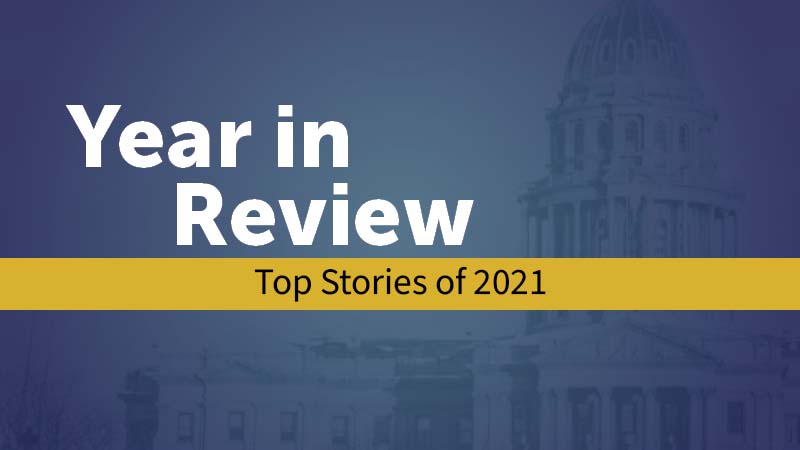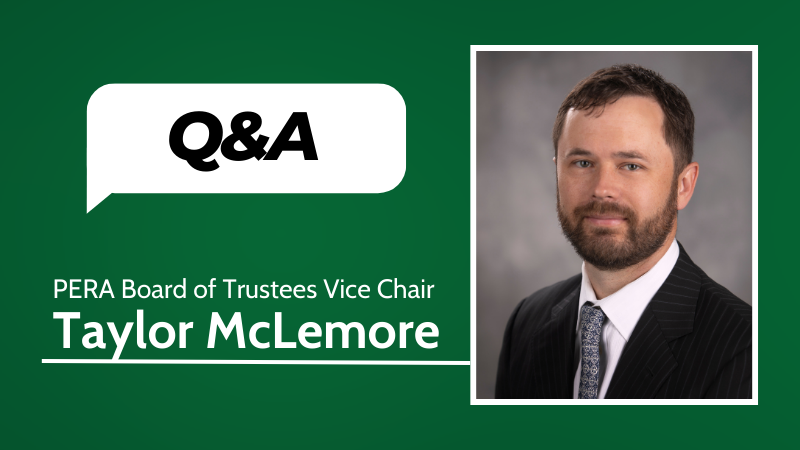As the COVID-19 pandemic entered its second year in 2021, the world faced continued challenges and uncertainty. The top stories on PERA On The Issues reflected readers’ interest in two key topics that were top-of-mind throughout the year: retiree health care and legislation that could affect PERA and Social Security benefits.
Here are the most-read stories from 2021:
2021 Proposed Legislation Status
The Colorado General Assembly considered four bills in 2021 that would affect PERA, two of which were signed into law. SB 21-228 created a cash fund to be used for future payments to PERA, and HB 21-1136 modified the rules for retired judges returning to judicial duties.
WEP/GPO Bill Introduced in D.C.
Many federal bills have been introduced over the years to eliminate or modify the Windfall Elimination Provision (WEP) and/or Government Pension Offset, and 2021 was no different. HR 82, which would repeal the WEP and GPO, was introduced in January, and HR 2337, which would modify the WEP, was introduced in April. Both bill have stalled in Congress.
PERACare Working to Cut Costs as Medicare Advantage Enrollment Grows
For 2022, PERACare is switching providers for its Medicare Advantage plans, with UnitedHealthcare replacing Anthem Blue Cross Blue Shield. The UnitedHealthcare plans will offer lower premiums and some lower copays while combining medical and prescription coverage under one company.
Recently Introduced divestment Bill Would Affect PERA Investments
Colorado lawmakers considered a bill that would have limited PERA’s investment options. HB 21-1246 would have directed the PERA Board to create an exclusion list of all of PERA’s direct investments in fossil fuel companies, and potentially sell those investments. The House Finance Committee chose to postpone the bill indefinitely.
Legislative Committee Seeks to Make Up Missed $225M Payment to PERA
When lawmakers made substantial budget cuts at the beginning of the COVID-19 pandemic in 2020, they passed legislation to forgo the state’s $225 million payment to PERA for that year. Lawmakers on the Pension Review Commission and Pension Review Subcommittee are seeking to introduce a bill in 2022 that will make up that payment, plus estimated investment gains.
Thank you to everyone who read PERA On The Issues and subscribed to our newsletter in 2021. We’ll continue following and unpacking the issues that matter to PERA’s many stakeholders like we’ve done for years. We’ll see you in 2022!
Windfall elimination provisionA provision of federal law that may reduce Social Security benefit payments to retirees who receive a pension based on work during which they did not contribute to Social Security. The WEP does not apply to those with 30 or more years of substantial earnings in Social Security.Government pension offsetA provision of federal law that reduces Social Security dependent benefit payments to spouses, widows, and widowers who receive a government pension like PERA.DivestmentThe act of selling one’s investments in a particular company or sector, often for philosophical or political reasons.DivestmentThe act of selling one’s investments in a particular company or sector, often for philosophical or political reasons.





Collins, Brown Introduce Bipartisan Bill to Ensure Public Employees Receive Full Social Security Benefits
In:
Press Releases
Posted Thu, 04/29/2021 – 23:00Share:
Washington, D.C. – U.S. Senators Susan Collins (R-ME) and Sherrod Brown (D-OH) led a bipartisan group of colleagues in introducing legislation that would ensure public sector workers and their families can receive full Social Security benefits after two previous statutes reduced them. The Social Security Fairness Act would repeal the Windfall Elimination Provision (WEP) and the Government Pension Offset (GPO) from the Social Security Act. Both of the statutes significantly reduce benefits for nearly 2.3 million Americans.
“Public servants from across the country, such as retired teachers and police officers, have dedicated their professional careers to public service, yet many face reduced retirement benefits due to the Windfall Elimination Provision and Government Pension Offset,” said Senator Collins. “I held the first Senate oversight hearing on this issue and have continuously worked to correct it. This important, bipartisan bill would eliminate these unfair provisions that have enormous financial implications for many public service employees. It would also give current public sector employees—many of whom are on the front lines of the COVID-19 crisis—the peace of mind to know that they will be able to receive their full Social Security benefits when they reach retirement age.”
“These workers have dedicated their careers to serving our communities, and it’s up to us to make sure they can retire with their full Social Security benefits,” said Senator Brown. “This small fix will help Ohio teachers, police officers, and other state and local government employees and their families have the peace of mind that their Social Security benefits will be there for them when they retire from a life of dedicated service.”
The Windfall Elimination Provision (WEP), enacted in 1983, reduces the Social Security benefits of workers who receive pensions from a federal, state, or local government for employment not covered by Social Security. The Government Pension Offset (GPO), enacted in 1977, reduces Social Security spousal benefits for spouses, widows, and widowers whose spouses receive pensions from a federal, state, or local government. Together, these provisions reduce Social Security benefits for nearly three million Americans – including many teachers and police officers.
The Social Security Fairness Act would repeal both the WEP and GPO statutes, ensuring public sector workers and their families receive their full Social Security benefits.
The bipartisan bill is supported by a number of national organizations, including Social Security Works, AFSCME, National Education Association, American Federation of Teachers, National Active and Retired Federal Employee Association, the Strengthen Social Security Coalition, International Union of Police Associations, National Association of Police Organizations, and the Fraternal Order of Police.
In addition to Senators Collins and Brown, the legislation is co-sponsored by Senators Tina Smith (D-MN), Lisa Murkowski (R-AK), Elizabeth Warren (D-MA), Bill Cassidy (R-LA), Michael Bennet (D-CO), Jack Reed (D-RI), Patrick Leahy (D-VT), Bob Casey (D-PA), Chris Murphy (D-CT), Patty Murray (D-WA), Bob Menendez (D-NJ), Sheldon Whitehouse (D-RI), Debbie Stabenow (D-MI), Catherine Cortez Masto (D-NV), Richard Blumenthal (D-CT), Maggie Hassan (D-NH), Jeff Merkley (D-OR), Tammy Baldwin (D-WI), Amy Klobuchar (D-MN), Chris Van Hollen (D-MD), Cory Booker (D-NJ) and Bernie Sanders (D-VT).